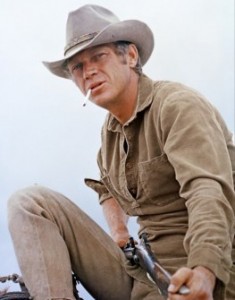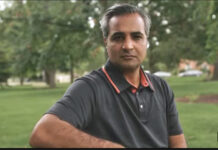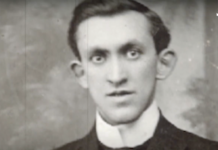By Yankee Gospel Girl —

They said he could act with the back of his head. No dialogue or frills required—his mere presence loomed larger than life in every shot. Put him next to some of the finest actors in the business, and he would undercut every one of them simply by being in the frame.
His piercingly distinctive blue eyes were set in a rough-hewn, unconventionally handsome face that rarely betrayed strong emotion. His smallest physical gesture was precisely calculated and gracefully executed. You couldn’t best him, you couldn’t buy him, you couldn’t touch him. He was the King of Cool. He was Steve McQueen.
He was the definition of a self-made man, working his way up from a horrific childhood of neglect, paternal abuse and a tough life on the streets to the gold-plated life of a Hollywood icon. He once said that he often had nightmares of everything he had gained being suddenly taken away from him. A man of many paradoxes, he was both humble and defiant, stingy and generous, gentle and violent, self-assured and insecure. Perhaps it was director Norman Jewison (Fiddler On the Roof) who summed him up best: “He was a loner, and he was troubled, and he was looking for a father.”
Everyone had a Steve McQueen story. His superior officers in the Marines could have told you how he spent 41 days in the brig for resisting arrest when caught AWOL. The young men at the Boys’ Republic where Steve had spent some of his teenage years could tell you how he regularly came back and visited the school after becoming famous, personally responding to every boy’s letters and financially supporting the school until his death. Magnificent Seven co-star Yul Brynner could tell you how McQueen stole scene after scene by deliberately throwing in extra, distracting bits of business. Bruce Lee could have told you about a hair-raising ride in Steve’s Porsche that had Lee cowering in the foot-well (and threatening to kill Steve when they stopped, causing a fearful McQueen to hit the gas again and refuse to slow down until Lee promised not to hurt him).
He was known to say that he lived for himself and answered to no one. Asked once if he believed in God, the actor brazenly replied, “I believe in me. God will be number one as long as I’m number one.” That philosophy informed much of his life. All the money, cars, alcohol, drugs and women that a man could ever want were at his fingertips, and it was only a matter of time before he became addicted in every way. Professional successes only inflated his ego. Wild experimentation with substance abuse drove him to the edge of mental stability. Though he tried to be a good father to the son and daughter of his first wife, his addictions, serial womanizing, jealousy and violence burned through two marriages.
By the late 1970s, his star was fading. The washed-up, aging characters he portrayed reflected where he himself was in his life and career. He felt empty and unsatisfied. He began turning down huge offers and retreating into his own private shell. He was also developing health problems with his lungs. Doctors told him he should move, so in the spring of 1979, he left Malibu for the small, quiet town of Santa Paula, where he ultimately married his third wife Barbara Minty. For a period of time, they lived in an airport hangar which he had filled with his entire motorcycle collection. He bought a yellow Stearman bi-plane and learned to fly it, quickly mastering the craft as he had mastered motor racing before.
The pilot who taught him was a man in his early 60s by the name of Sammy Mason. Self-described as cranky and difficult to get along with, he became fast friends with McQueen. As they shared long hours in the air, talking together about the meaning of life, Steve sensed that there was something different about him. The more time they spent together, the more he wanted to know what Mason’s secret was. One day he asked him outright. Mason sat down with the aging actor and explained what, or rather who, had made the difference in his life. The answer, he said, was Jesus Christ.
McQueen was intrigued. He had so much respect for Mason and his family that he began regularly attending Ventura Missionary Church with them. The pastor was Leonard Dewitt. DeWitt later recalled that the famous icon had sat quietly in the balcony without even introducing himself for several months. When he finally requested a meeting with the pastor, he began firing off questions about life and faith, one after another. After a couple of hours, he leaned back and said, “Well, that about covers it for me.” Dewitt said, “Steve, I just have one question for you.” McQueen flashed his signature grin. “You want to know if I’ve become a born-again Christian,” he preempted. Then “still smiling, but very serious,” he told DeWitt that one morning when the pastor had given the invitation, he felt convicted by the Spirit and came forward. “When you invited people to pray with you to receive Christ, I prayed. So yes, I’m a born-again Christian.”
Everybody around him could tell that he was changed. In Sammy Mason’s words, it was “dramatic.” He said, “I doubt that I have ever seen a man flourish with more spiritual reality in such a short time.” Another close Christian friend, John Daly, said that the star’s conversion had stunned him. But when Steve talked about his new-found faith, there was no denying the seriousness of his commitment. In Daly’s words, “I think I had more faith that my saw and hammer would have gotten converted before Steve, but I was hearing it from the horse’s mouth. I was blown away.” Under the discipleship of Mason and DeWitt, McQueen could often be found praying or poring over his Bible. Around that time, he heard Kris Kristofferson’s “Why Me, Lord” and embraced the lyrics as his own testimony. He also shared his testimony with friend and former personal assistant Mario Iscovich, who a decade earlier had been forced to stand by and watch as the actor “lost himself” down the “dark, ugly road” of his sin. As Iscovich puts it, McQueen “felt he had hurt a lot of people” but had finally “made peace with God.”
Shortly afterwards, McQueen traveled to Chicago to shoot his last film, The Hunter. Although his health was continuing to deteriorate, he was actively reaching out to various people in need. (He had always been generous, especially to kids, but now it sprang from a desire to serve God instead of trying to “cancel out” wrongdoings only Christ crucified could pay for.) One of the film’s extras was a feisty 15-year-old girl named Karen Wilson, who had no money to attend school and was working to provide for her family and dying mother. Immediately after visiting the family’s squalorous ghetto home, McQueen asked if he and Barbara could take the girl back to California with them and send her to school there. Eventually the mother agreed, and the couple went on to become Karen’s legal guardians. Her mother succumbed to cancer almost a year later. Today, Karen is happily married with a family of her own.
Also on the set of The Hunter, he gave his last interview to a highschool student named Richard Kraus, who had initially been turned away by McQueen’s stuntman and told that he never gave interviews. The stubborn teen wouldn’t take no for an answer and found a way to approach the legend himself, who readily agreed. Both the interview and the whole story in Kraus’s own words can be found here.
In December of that year, he was officially diagnosed with pleural mesothelioma, a fast-spreading and incurable form of cancer. The news was crushing because McQueen had expected God to use him in some great way now that he was converted. But he told Pastor DeWitt that he was able to endure it because at least he knew where he would spend eternity. Still, he was ready to try anything for the sake of his children—too ready, unfortunately. It led him down an almost year-long road of “unconventional” remedies where he was essentially taken advantage of by quack doctors (including a faith healer), all to no avail. We have a tape-recorded conversation from this time period where McQueen is talking about his illness, his faith, and the change in his life. “My body is broken,” he says, “but my spirit isn’t broken. My heart isn’t broken.” You can hear his voice crack when he shares dreams of “changing some people’s lives with what I know of the Lord, and what I have to offer with what’s happened to me.” He hoped to move to his wife’s ranch in Idaho and impact the community there. Sadly, he never got his wish.
One of the last people Steve talked to was none other than Billy Graham, whom the actor had long wanted to meet. DeWitt informed his contacts in the Graham organization that McQueen didn’t have much time left and wanted to see the evangelist if it could at all be arranged. Graham came right before McQueen was flown to a hospital for surgery to remove his tumors. Bed-ridden and on oxygen, McQueen was still, in Graham’s words, “a fighter.” Graham recalls, “Under that oxygen, he would talk. His eyes were just as bright, but he looked emaciated and old.” He poured out his life’s story to the evangelist, telling him about his friend Sammy Mason, telling him how God had made him a new man. McQueen had misplaced his Bible, so Graham personally inscribed his own Bible and gave it to the dying actor. He stayed by McQueen’s side and prayed with him until they reached the airport, then saw him off on the plane.
McQueen would not survive the operation. Four days after his meeting with Graham, he died of a heart attack with the evangelist’s Bible resting on his chest. It was opened to his favorite verse, that old, familiar promise so simple a child could grasp it, yet so profound the angels cannot comprehend it: For God so loved the world, that he gave his only begotten Son, so that whosoever believeth in him should not perish, but have everlasting life.
Today, he is still idolized and remembered for what he left behind in his films. But as remarkable as that legacy is, it will fade away like a forgotten dream at the dawning of eternity’s day. For when the grass has withered, and the young men have utterly fallen, and time like an ever-rolling stream has borne all its sons away, we shall be left with two wonders only: our own worthlessness and God’s redeeming love. May we all so pass through things temporal that we finally lose not the things eternal.
I’ll close with a fitting song, a beautiful marriage of lyrics and music by Marc Cohn. This is called “Old Soldier.”
Listen, old soldier, wherever you are
The hills or the valleys, come near or come far
They say youth is a treasure we waste when we’re young
So come down from the place where your medals are hung
You’re forever returning and learning to fight
And you feel just like an old soldier tonight…
If you want to know more about a personal relationship with God, go here
Note: This story originally appeared on a blog that’s worth checking out…Southern Gospel Yankee.




This is a great report. Amazingly enough my wife and I attended a Marine 4th of July base party a couple of summers ago and met a retired Staff Sargent who knew Steve McQueen very well and spoke of the fascinating motorcycle rides that the two of them would take on weekends. This Staff Sargent said exactly what is reported here – ” That Steve always was looking for the father he never had.” which is one reason he took to this older and wiser Sargent. This untold journey toward faith is not unlike that of Van Gogh who writer Mark Ellis has also written about here on Godreports. https://www.godreports.com/2012/11/vincent-van-goghs-unappreciated-journey-with-christ/ See also- http://www.creativestorytellers.com/vangogh
Thanks for sharing this amazing story,
William Havlicek PhD.
Hi Mark! I see you got a pingback from the Christian Post here. That’s great! If you don’t mind, could you include a link to the original story on my site? Thanks! Blessings.
Got it…done!
Thank you. You have an awesome day.
This is a story that should be told to the millions of Christians out there who are unaware of it. It will inspire many to help share ‘their story’ will their friends as well. Go to http://www.16AmazingStories.com for more.
Thank you for this story…I found this during my search about him…and I am so glad he found his faith in God before he died. I am sorry that he could not deliver his faith as he wanted but this story will. We never know the person that will forever change our life by leading us or at least showing us that there is peace knowing and believing in God and Jesus Christ.
Today, I heard Steve McQueen’s voice in the living room…one of my favorite actors
of all time. My husband had found a station that played an old show called “Wanted, Dead or Alive” which aroused that “feeling in me” to want to know more than I could ever remember or know about him before the internet on the internet. His bio shocked me, we always have these great images of the people we love in the movies..it shows we all have a story growing up that we keep deep inside and only share with the people we trust or spew out during our worst of times, but in the end some of us are lucky enough to find someone or something that gives us peace..
Ironic I thought that “Wanted Dead or Alive” could be so meaningful at such a time in his life.
I really enjoyed this article, glad to learn that Steve turned to Christ at the end of his life. Do you know if any or all of the biographies of him include this information? I’d love to get a copy that tells his whole story and especially goes into detail of his Christian life. I don’t want to buy just any edition, to me they’d be leaving the best part out if the author didn’t talk about what you have discussed. But with with non Christian biographers, I doubt they’d include this.
‘The Final Chapter’ by Grady Ragsdale Jr. is the book that probably touches on this part of his life the most. Steve led a full life, so you might be hard-pressed to find just one book that tells all of his previous life and also details his Walk.
Comments are closed.